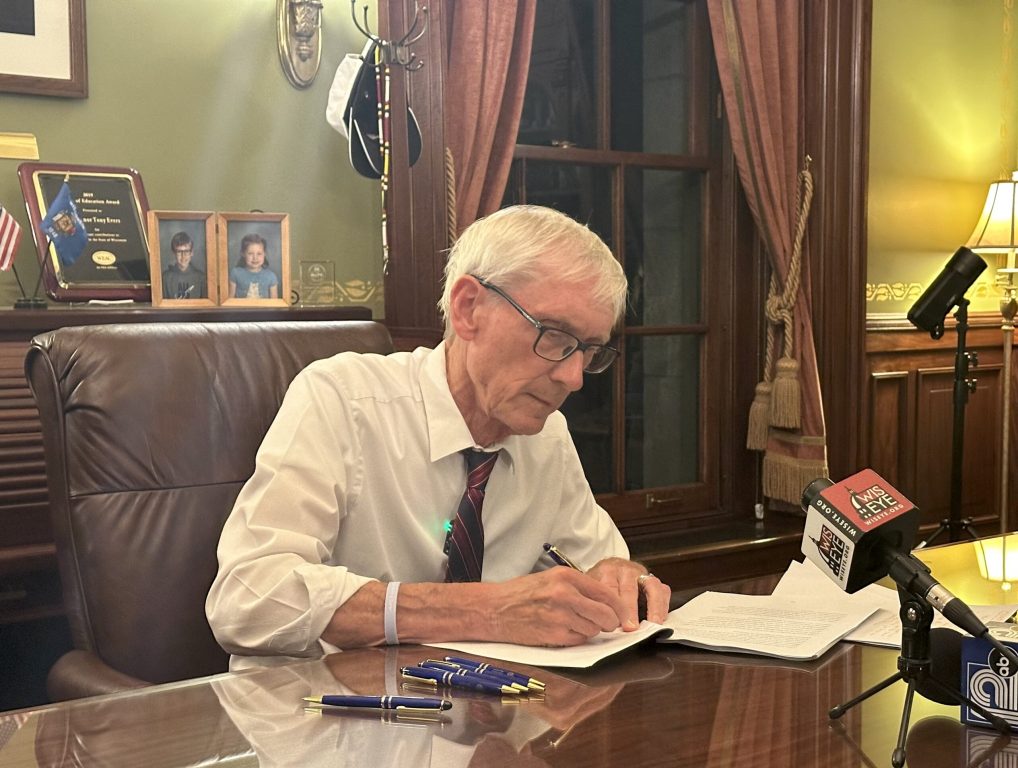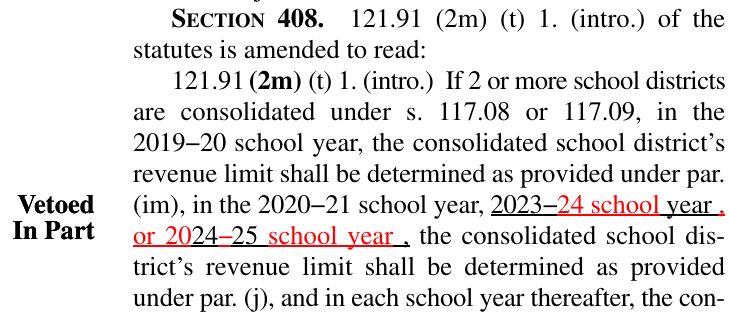Republicans Move to Repeal Gov. Evers’ 400-Year School Funding Hike
If the bill passes the Legislature, it would face ironic hurdle: Evers' veto pen.

Gov. Tony Evers signs the 2025-2027 Wisconsin state budget into law early on Thursday, July 3, after an all day and night debate in the state Senate and Assembly, in his office at the Wisconsin State Capitol, in Madison, Wis. Anya van Wagtendonk/WPR
Two years ago, Gov. Tony Evers made national headlines when, with the stroke of his veto pen, he transformed two years of school funding in the state budget into 400 years.
Now, Republican lawmakers are circulating a bill that would repeal the results of that veto, arguing it amounts to an unfair property tax increase in perpetuity.
“The pilgrims landed at Plymouth Rock 402 years before this veto. It is hard to justify locking in a funding increase for just as long into the future,” the bill’s four coauthors said in a cosponsorship memo circulating at the state Capitol.
Evers 2023 veto struck digits and a hyphen from a budget line that Republican drafters of the state budget intended to increase per-student funding for two years, through the “2024-25 school year.”
The result of that change is an annual increase in per-pupil spending of $325, every year until the year 2425.

A screenshot of Gov. Tony Evers’ partial veto that extended a school funding increase by 400 years. Courtesy Wisconsin Legislative Reference Bureau
As written, the new GOP proposal would repeal that annual increase after the 2026-27 school year.
“One man locked in a tax-raising mechanism that no one voted for and no one approved. Evers’ move bypassed both the elected Legislature and the hard-working people who pay the bills,” reads the cosponsorship memo.
If the bill passes the Legislature, it will face one significant hurdle to becoming law: Evers’ veto pen.
A spokesperson for Evers did not respond to the specifics of the plan but referred WPR to Evers’ statement when the Supreme Court upheld his veto in April.
“Doing what’s best for our kids is what’s best for our state, and I will never stop fighting to do more for our kids and our schools,” Evers said at the time.
400-year veto sparked pushback in the Legislature
GOP lawmakers have been responding to the 400-year veto ever since Evers issued it. Legislatively, that’s translated to proposed constitutional amendments which would weaken a Wisconsin governor’s partial veto authority.
Constitutional amendments must pass two separate and consecutive sessions of the Legislature, and then be approved by voters. They are not subject to a governor’s veto. That proposed amendment has not yet been reintroduced this session.
A different but related amendment was proposed in this session. This one would only allow governors to veto sections of a spending bill that could be enacted separately “as a complete, entire, and workable law.”
The Wisconsin Supreme Court decision that upheld Evers’ partial veto in April found that its use is constitutional regardless of how “significant and attention-grabbing” its outcome is.
“Our constitution does not limit the governor’s partial veto power based on how much or how little the partial vetoes change policy, even when that change is considerable,” Justice Jill Karofsky wrote in a 4-3 opinion that was joined by the rest of the court’s liberals.
After that decision, the specter of the veto hovered over this year’s legislative debate. Some Republican lawmakers argued that they could no longer operate in good faith with an executive who was so empowered. They introduced many spending bills without funds attached, arguing that would prevent Evers from making funding decisions of his own via the veto pen. Democrats responded that Republicans were pushing unfunded mandates.
Wisconsin’s complicated, bipartisan partial veto history
Wisconsin’s partial veto dates back to 1930, and was designed as an effort to limit lawmakers from forcing too many funding items into large bills. In recent decades, it has been used by both Democratic and Republican governors.
In 2017, former Republican Gov. Scott Walker struck individual digits in a state budget to transform a one-year moratorium on certain school referendums into a 1,000-year moratorium.
Those and other uses of the partial veto have been upheld by the state Supreme Court, although the power has been limited in a few ways by voters.
In 1990, voters approved a constitutional amendment barring governors from creating new words by striking individual letters, known as the “Vanna White veto.” In 2008, they also approved a constitutional amendment barring governors from doing what Doyle did, combining unrelated sentences in what was called a “Frankenstein veto.”
Wisconsin Republicans move to repeal Gov. Tony Evers’ 400-year school funding increase was originally published by Wisconsin Public Radio.
If you think stories like this are important, become a member of Urban Milwaukee and help support real, independent journalism. Plus you get some cool added benefits.





















